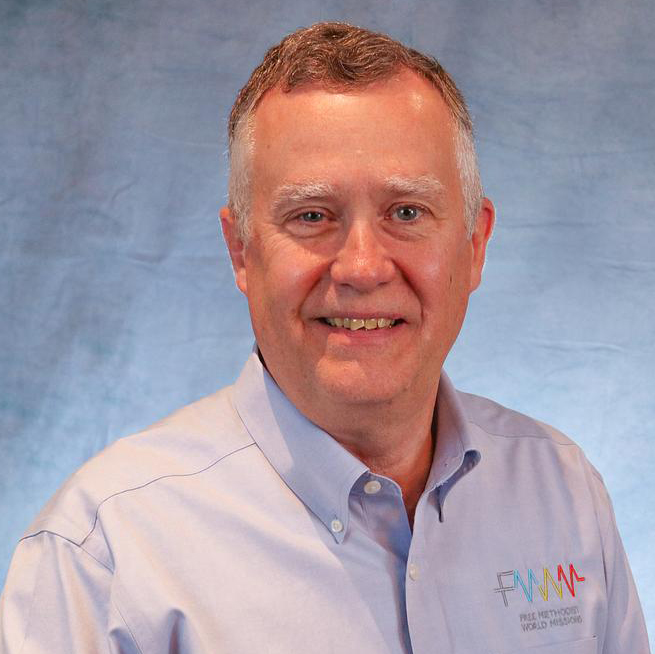
Gerald Coates
Gerald Coates is an ordained elder who serves as the strategic catalyst for global collaboration on the Free Methodist Church USA Executive Leadership Team and as the director of global engagement for Free Methodist World Missions. He previously served as the senior pastor of Moundford Free Methodist Church and as the denominational communications director.
By Gerald Coates
The curse of the fall is answered in the hope of the gospel. Not only so, but every detail about the curse is answered exactly by the gospel. The curse of death is answered by the hope of life. Impurity and wickedness are answered by righteousness and holiness. The creation itself, which was subjected to frustration, is liberated from its bondage to decay into the freedom and glory of the children of God. The ravages of slavery are answered by freedom. Justice answers tyranny. Anxiety is answered by peace.
One of the curses is the fallen human tendency to be self-centered to the extent people are bent towards ethnocentrism. That bent is answered in the gospel and through a vision given to John by which we are enabled to have a glimpse of the full deliverance offered in the gospel:
After this I looked, and there before me was a great multitude that no one could count, from every nation, tribe, people and language, standing before the throne and before the Lamb. They were wearing white robes and were holding palm branches in their hands. And they cried out in a loud voice:
“Salvation belongs to our God,
who sits on the throne,
and to the Lamb.”
(Revelation 7:9-10)
_
“We hope that through Jesus, as promised to Abraham, all nations will be blessed.”
_
The curse of ethnocentrism is seen both in the nature of arrogant nationalism as well as in the realm of blatant and furtive racism. The hope of the gospel is that the power of the cross, which has torn down the dividing wall of hostility between Jews and Gentiles, is also the means by which we can not only survive but thrive together. We hope that through Jesus, as promised to Abraham, all nations will be blessed.
As we apply the power of the gospel to issues of tribalism, racism, nationalism, and ethnocentrism, we come to realize the very nature of the means by which God has created us to work together to address the results of the fall. So we invest heavily in Cross-Cultural Collaboration both domestically and internationally.
The Cross-Cultural Collaboration focus group will explore The Free Methodist Way through both of those perspectives. Practitioners from both the global and U.S. church will guide our thinking around the ways God-Given Revelation, Christ-Compelled Multiplication, Love-Driven Justice and Life-Giving Holiness intersect with Cross-Cultural Collaboration. Participants will be engaged in discussion and prayer with smaller table groups as well as engaging with the broader representation of practitioners.
Tuesday, July 25: God-Given Revelation
Eric Spangler and Soo Ji Alverez will lead our day Tuesday engaging in God-Given Revelation.
Eric is entering his 10th year as Asia Area director for Free Methodist World Missions where he spearheads a vision to see 1 million Asians influenced toward Jesus. He has an earned doctorate of intercultural studies from Fuller Theological Seminary. Eric has a passion for Jesus and loves His word. Eric has been married to the love of his life for 36 years. He and Virginia have four grown children and one granddaughter.
Soo Ji Alvarez is the lead pastor of The Avenue, a multiethnic church in Riverside, California. She is also a field superintendent for the Free Methodist Church in Southern California and the conference director for Wesleyan Holiness Women Clergy. She is ordained with the Free Methodist Church and has been a speaker and advocate for women in ministry, gender equality, diversity, justice and the AAPI community. Soo Ji is Korean-Canadian and loves doing life and ministry with her Mexican-American husband, Joe.
Wednesday, July 26: Christ-Compelled Multiplication
On Wednesday, our thoughts on Christ-Compelled Multiplication will be led by John Jairo Leal and Chris Pulice.
John Jairo Leal is the director of community church planting for Impact Latin America. Originally from Colombia, he completed an undergraduate degree in theology and studies in church planting. He has served as a pastor, church planter, seminary teacher, and writer of pastoral training materials. John Jairo lives in Medellín, Colombia, with his wife, Susana, and his two daughters, Isabella and Valentina. When he is not working, he likes to watch movies and see new places with his family.
Chris Pulice, along with his beautiful wife and five children (the fifth is on the way), live in Aberdeen, Maryland. Chris serves as a church planting coordinator for the Acts 12:24 Churches and mission advancement with Church Development Network. He graduated from Northeastern Seminary in 2013 and has a passion for multiplying churches in creative spaces and places.
Thursday, July 27: Love-Driven Justice
Our Thursday focus is on Love-Driven Justice and will be led by two outstanding leaders, Stella Bokare and Amelia Cleveland-Traylor.
Stella Bokare’s vision for her life is to see generations being raised for Jesus. Her first field of application is her family and her work context with ICCM. She has been the ICCM South Asia regional coordinator for the past 10 years, and this role has led her to avenues of social justice in her work region. With her Ph.D. in holistic child development, she would like to be identified as a child advocate. She currently works as ICCM’s global program director. She describes the opportunity to follow God’s lead in this ministry as an immense blessing. She is married to Rev. Girish Bokare.
Amelia Cleveland-Traylor and her husband cofounded Christ Community Fellowship in Twinsburg, Ohio. She has served as co-superintendent of The River Conference and currently chairs the FMCUSA BOA committee on diversity and justice. She has been privileged to participate in short-term mission trips to Malawi, Kenya, and Rwanda (Africa). She is also a board-certified obstetrician gynecologist currently employed by the OB Hospitalist Group. She became a certified group fitness instructor in 1998 and enjoys dance, Zumba, aerobics, music, basketball, and football (specifically the Cleveland Browns). She has been married to Michael Traylor since 1987 and has two marvelous children, Matthew and Michaela.
Friday, July 28: Life-Giving Holiness
Our final day on Friday will highlight the value of Life-Giving Holiness. The presenters for the day will be Kenny Martin and me.
Kenneth Martin, “Pastor Kenny,” as he is more commonly known, has traveled extensively throughout the United States and abroad preaching and teaching the good news of the gospel of Jesus Christ. His global vision, “to touch the world for Christ,” transcends and encompasses all cultures, socio-ethnic backgrounds, denominations and age groups. In October 2022, Pastor Kenny and his wife, Pastor Estelle Martin, began a church plant, Kingdom Cathedral in San Bernardino, California, to minister to the lost, the least, and the lonely who have been forgotten. The main focus of Kingdom Cathedral is to shepherd and disciple those who are experiencing homelessness. “We bring the church to them.” They also use their home, The Kingdom Ranch, for pastors, leaders, and small groups for rest, replenishment and relaxation. They also have Kingdom discipleship groups and leadership development and training. Pastors Kenny and Estelle have two daughters, three grandsons, and one granddaughter.
I have been married to Jan for nearly 36 years. We have three sons, and two grandsons. As a fifth general Free Methodist elder, my roots go deep in the Free Methodist Church. I currently serve as director of global engagement for Free Methodist World Missions and as strategic catalyst for Cross Cultural Collaboration for the Free Methodist Church USA. I have pastored four churches in the Gateway Conference and been engaged in two church plants. I served for over 30 years as instructor for Free Methodist history and polity, and I have traveled to 40 countries engaged in work with the FMC.
Daily Prayer
Each day will close with concerted time in prayer led by Megan Weber. Megan is a veteran missionary to the Middle East. She has a passion for prayer and has a particular giftedness for reaching Arabic-speaking people.
_
“While we praise God for this growth, we know there are so many more who need to know Jesus.”
_
Cross-Cultural DNA?
We are working together both internationally and domestically to reflect the value of every person for the kingdom. I have recently been thinking about what it would look like if this Cross-Cultural Collaboration value were successfully implanted in the DNA of the Free Methodist Church USA.
1. Every FMCUSA church engaged in the global mission of God by both contributing to and receiving from the international FM church. The body of Christ was never intended to act independently. At the micro level at the local church, we understand Paul’s teaching to the church at Corinth about the unity and diversity in the body. It is also true at the macro level when we talk about the body of Christ from different cultures and nations. Sometimes, it is possible that a part of the body might see itself as superior to another part of the body, the very warning Paul gives in 1 Corinthians 12:21 ff. Just because a part of the body from another culture does not contribute in material things does not mean they are not rich in spiritual things. In the last 20 years, the global Free Methodist Church has doubled in membership and expanded into an additional 43 countries bringing a Free Methodist presence into over 100 countries. While we praise God for this growth, we know there are so many more who need to know Jesus. What we may not be as quick to see is the resources God has entrusted to our global family. In “Theology in the Context of World Christianity,” Timothy Tennent has summarized what our global sisters and brothers are able to bring to us. He calls them “Five Trends in the Theology of Majority World Christians.” Notice how closely these relate to The Free Methodist Way. (Parentheses below are mine.)
a) These believers accept the authority of Scripture and, by Western standards, hold a theology considered conservative, orthodox, and traditionalist. (God-Given Revelation)
b) Majority World Christians are more likely to be morally and ethically conservative.
c) These new, younger churches are more likely to be sensitive to the Christian responsibility to address issues related to poverty and social justice. (Love-Driven Justice)
d) These younger churches are experienced at articulating the uniqueness of the gospel in the midst of religious pluralism. (Cross-Cultural Collaboration)
e) Majority World Christians are more likely to grasp the corporate (not just individualistic) dimensions of the teaching of the New Testament. (Life-Giving Holiness)
While Tennent’s list does not directly include Christ-Compelled Multiplication, it is an obvious conclusion that the majority world church is multiplying.
_
“It is our responsibility to not only steward the gifts entrusted to us, but to receive the gifts entrusted to others.”
_
One of the gifts the Majority World church has for us is their experience in articulating the uniqueness of the gospel in the midst of religious pluralism. This is a gift the Western church will increasingly need given its current context. We can only receive that gift if we engage cross culturally both overseas and at home. God has gifted the church with the resources needed for His mission. It is our responsibility to not only steward the gifts entrusted to us, but to receive the gifts entrusted to others. We are better together.
2. Every FMCUSA church finding creative ways to reach cross culturally in their community with the ethnically and/or socioeconomically diverse population in their community. In Jesus’ day, the greatest ethnic tension for the Jews was with the Samaritans. Jesus addressed this both with His teaching and by His example with the story of the Good Samaritan and His conversation with the Samaritan woman. During the post-resurrection appearance of Jesus where He meets His disciples and gives them and us the Great Commission, Jesus particularly identifies the Samaritans. The principle here tells us that reaching to the ends of the earth without addressing the pressing ethnic tensions of our own is not fulfilling the Great Commission.
Not every Free Methodist church in the United States finds itself located within an ethnically diverse population. But even in those communities, there is socioeconomic diversity. It gets at B.T. Roberts’ original mission statement for the Free Methodist Church “to spread scriptural holiness across these lands and to preach the gospel to the poor.”
3. Every FMCUSA church embracing the principles of heterogeneity (the quality or state of being diverse in character or content) and interdependency (the dependence of two or more people or things on each other) as the biblical standard of the kingdom. During the height of the church growth movement in the United States, a principle of homogeneity was infused into the theology of the 20th and 21st century church. The principle simply understood was church growth happens rapidly and naturally when people gather in homogenous (of the same or a similar kind or nature) groups. While this is probably true, the question on the minds of many holiness people of the day was: “Does this actually reflect the standards of the kingdom?” A quick look at Acts 2 does not give a picture of homogeneity but of heterogeneity. The early struggles of the church were because the gospel was given to both Jews and Greeks. Here there is no Gentile or Jew, circumcised or uncircumcised, barbarian, Scythian, slave or free, but Christ is all, and is in all (Colossians 3:11). Paul’s letters not only address the pressing issue of heterogeneity in the early church but of interdependency. We are better together than we are alone.
4. Every FMCUSA member joining in God’s heart for the widows, orphans and foreigners living among us. The heart of God for those outside is expressed at multiple levels throughout Scripture. From early on in the journey, God expressed a particular love for the widows, orphans and foreigners. In Exodus 22 we find the first warning of arousing God’s anger is because of the mistreatment of these specific vulnerable groups of people.
In a day when nationalism and patriotism seems to trump concern for the vulnerable in many circles, it is essential for every member of the FMCUSA to be first in touch with the heart of God. Cross-Cultural Collaboration means we care for the marginalized because it is the essence of the incarnate Christ.
5. Every FMCUSA member joining together to care for the hungry, thirsty, stranger, naked and imprisoned in our communities. As Jesus was explaining the nature of the kingdom of God to His disciples, He used the influence of story to communicate essential truths. His story about the sheep and the goats revealed the heart of God for those weakest in our society, those who have no hope outside of Christ and His church. John Wesley located service through works of mercy to these vulnerable closer to the love of God than prayer, Scripture reading and fasting. (See Wesley’s sermon “On Zeal.”)
While the church may have specific outreach ministries that reach out to the marginalized, it is when the membership of the church embraces God’s heart that community transformation begins to take hold through relationships being developed that cross micro cultures.
Our prayer for the Cross-Cultural Collaboration focus group is that we may deeper instill the values of The Free Methodist Way into the fabric of the life of the FMCUSA. We’d love for you to join us.
+

Gerald Coates
Gerald Coates is an ordained elder who serves as the strategic catalyst for global collaboration on the Free Methodist Church USA Executive Leadership Team and as the director of global engagement for Free Methodist World Missions. He previously served as the senior pastor of Moundford Free Methodist Church and as the denominational communications director.









